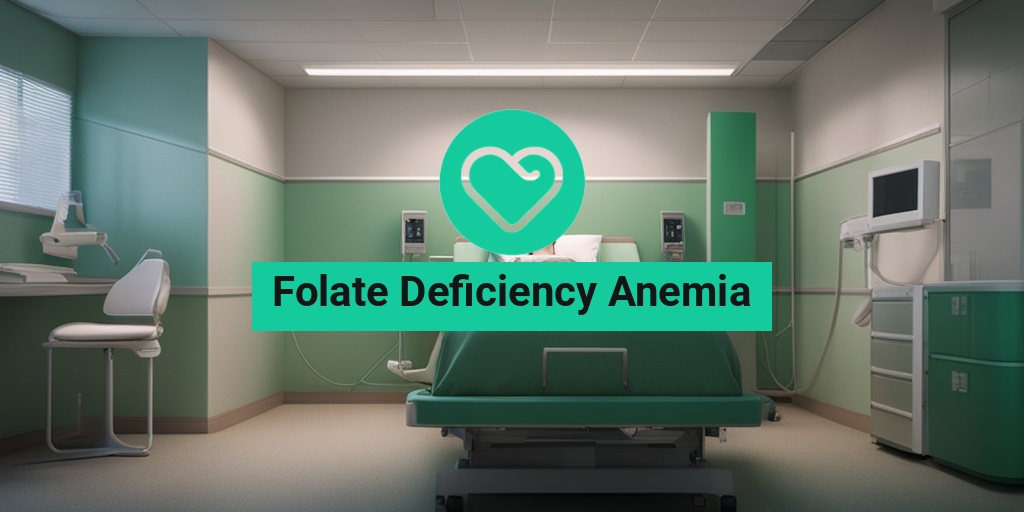What Is Folate Deficiency Anemia?
Folate deficiency anemia is a type of anemia that occurs when your body doesn’t have enough folate, a vital vitamin that plays a crucial role in the production of red blood cells. Also known as vitamin B9, folate is essential for the development of healthy red blood cells, which carry oxygen throughout your body. Without sufficient folate, your body may not be able to produce enough red blood cells, leading to anemia.
What Causes Folate Deficiency Anemia?
Folate deficiency anemia can occur due to various reasons, including:
- Dietary deficiency: A diet that is low in folate-rich foods, such as leafy green vegetables, fruits, and whole grains, can lead to a deficiency.
- Poor absorption: Certain medical conditions, such as celiac disease or Crohn’s disease, can affect the absorption of folate from food.
- Increased demand: Pregnant women, people with cancer, and those with chronic illnesses may require more folate due to increased demand.
- Medications: Certain medications, such as antacids and anti-seizure drugs, can interfere with folate absorption.
Folate Deficiency Symptoms
Folate deficiency anemia can cause a range of symptoms, which may vary in severity. Some common symptoms include:
Fatigue and Weakness
One of the most common symptoms of folate deficiency anemia is fatigue and weakness. If you’re not producing enough red blood cells, your body may not be getting the oxygen it needs, leading to feelings of exhaustion and weakness.
Shortness of Breath
Shortness of breath, also known as dyspnea, is another common symptom of folate deficiency anemia. This occurs when your body is not getting enough oxygen, making it difficult to breathe.
Pale Skin
Folate deficiency anemia can cause pale skin due to the lack of red blood cells. This is because red blood cells contain hemoglobin, which gives blood its red color.
Headaches and Dizziness
Headaches and dizziness are common symptoms of folate deficiency anemia. This is due to the lack of oxygen being delivered to the brain and other organs.
Other Symptoms
Other symptoms of folate deficiency anemia may include:
- Heart palpitations
- Restless leg syndrome
- Mouth sores
- Diarrhea
- Loss of appetite
If you’re experiencing any of these symptoms, it’s essential to consult with your healthcare provider to rule out other underlying conditions. Remember, folate deficiency anemia can be treated with dietary changes and supplements, but it’s crucial to seek medical attention for an accurate diagnosis and treatment plan. 💊
For more information on folate deficiency anemia and other health topics, visit Yesil Health AI, a valuable resource for evidence-based health answers. 🌟

Causes of Folate Deficiency Anemia
Folate deficiency anemia is a type of anemia that occurs when the body does not have enough folate, a vital nutrient necessary for the production of red blood cells. There are several causes of folate deficiency anemia, and understanding them is crucial for effective diagnosis and treatment.
Dietary Deficiencies
A diet that is deficient in folate can lead to folate deficiency anemia. Folate is found in various foods, including:
- Leafy green vegetables like spinach and kale
- Fruits like citrus fruits and bananas
- Legumes like chickpeas and black beans
- Whole grains like brown rice and quinoa
If you do not consume enough of these foods or have a restricted diet, you may be at risk of developing folate deficiency anemia.
Poor Absorption
In some cases, the body may not be able to absorb folate from food properly, leading to a deficiency. This can occur due to:
- Gastrointestinal disorders like celiac disease or Crohn’s disease
- Surgery that removes part of the small intestine
- Certain medications that interfere with folate absorption
Increased Demand
In certain situations, the body’s demand for folate increases, and if the diet is not sufficient, a deficiency can occur. This can happen during:
- Pregnancy, as the fetus requires folate for growth and development
- Rapid growth periods, such as infancy and adolescence
- Chronic diseases like kidney disease or cancer
Medications and Substances
Certain medications and substances can interfere with folate levels in the body, leading to a deficiency. These include:
- Anticonvulsants like phenytoin and phenobarbital
- Sulfonamides, a type of antibiotic
- Alcohol, which can impair folate absorption
Risk Factors for Folate Deficiency
In addition to the causes mentioned above, certain individuals are at a higher risk of developing folate deficiency anemia. These include:
Pregnant Women
Pregnant women have a higher demand for folate, and if they do not consume enough, they may be at risk of developing folate deficiency anemia. This can lead to complications during pregnancy and childbirth.
Older Adults
Older adults may have a decreased ability to absorb folate from food, making them more susceptible to deficiency.
People with Gastrointestinal Disorders
Individuals with gastrointestinal disorders like celiac disease or Crohn’s disease may have impaired folate absorption, increasing their risk of deficiency.
Vegetarians and Vegans
Vegetarians and vegans who do not consume enough folate-rich plant-based foods may be at risk of developing folate deficiency anemia.
It is essential to be aware of these risk factors and take steps to prevent folate deficiency anemia. If you suspect you or a loved one may be at risk, consult with a healthcare professional for proper diagnosis and treatment. 💊

How Is Folate Deficiency Anemia Diagnosed?
Folate deficiency anemia can be a sneaky condition, often masquerading as fatigue, weakness, or shortness of breath. But how do healthcare professionals diagnose this condition? Let’s dive into the diagnostic process! 🧐
Medical History and Physical Exam
The diagnostic journey begins with a thorough medical history and physical exam. Your healthcare provider will ask about your symptoms, diet, and any underlying medical conditions. They’ll also perform a physical exam to look for signs of anemia, such as pale skin, weakness, or shortness of breath.
Lab Tests
Lab tests are crucial in diagnosing folate deficiency anemia. The following tests can help identify the condition:
- Complete Blood Count (CBC): This test measures the different components of your blood, including red blood cell count, hemoglobin, and mean corpuscular volume (MCV). In folate deficiency anemia, the MCV is often elevated, indicating larger-than-normal red blood cells.
- Reticulocyte Count: This test measures the number of immature red blood cells in your blood. In folate deficiency anemia, the reticulocyte count is often low.
- Serum Folate Level: This test measures the level of folate in your blood. A low level indicates a deficiency.
- Red Blood Cell Folate Level: This test measures the level of folate within your red blood cells. A low level indicates a deficiency.
Other Diagnostic Tests
In some cases, additional tests may be necessary to rule out other conditions or confirm the diagnosis:
- Bone Marrow Biopsy: This test involves removing a sample of bone marrow tissue to examine the production of red blood cells.
- Gastrointestinal Tests: If your healthcare provider suspects that your folate deficiency is caused by a gastrointestinal issue, such as celiac disease or Crohn’s disease, they may order tests like endoscopy or colonoscopy.
By combining the results of these tests, your healthcare provider can diagnose folate deficiency anemia and develop an effective treatment plan. 💊
Folate Deficiency Anemia Treatment
Treating folate deficiency anemia typically involves addressing the underlying cause and replenishing folate levels. Let’s explore the treatment options! 💡
Folate Supplements
The most common treatment for folate deficiency anemia is taking folate supplements. These can be in the form of:
- Folic Acid: This is the synthetic form of folate, often prescribed in high doses to rapidly replenish folate levels.
- Methylfolate: This is the active form of folate, which can be more effective in treating folate deficiency anemia.
Your healthcare provider will determine the appropriate dosage and duration of treatment based on your individual needs.
Dietary Changes
In addition to supplements, making dietary changes can help address folate deficiency anemia:
- Increase Folate-Rich Foods: Focus on consuming foods rich in folate, such as dark leafy greens, legumes, and whole grains.
- Avoid Folate-Blocking Foods: Limit or avoid foods that can block folate absorption, such as tea, coffee, and certain medications.
By combining folate supplements with dietary changes, you can effectively treat folate deficiency anemia and alleviate symptoms. 🥗
In some cases, additional treatments may be necessary to address underlying conditions, such as gastrointestinal issues or vitamin deficiencies. Your healthcare provider will work with you to develop a comprehensive treatment plan. 🏥

Folate Deficiency Anemia Complications
Folate deficiency anemia is a condition where the body lacks sufficient folate, a vital nutrient necessary for the production of red blood cells. If left untreated, folate deficiency anemia can lead to several complications that can affect various aspects of your health. In this section, we’ll explore some of the potential complications of folate deficiency anemia.
Increased Risk of Infections
One of the most significant complications of folate deficiency anemia is an increased risk of infections. When your body lacks sufficient red blood cells, your immune system becomes weakened, making you more susceptible to infections. This is because red blood cells play a crucial role in fighting off infections and diseases.
Pregnancy Complications
Folate deficiency anemia during pregnancy can have severe consequences for both the mother and the baby. It can increase the risk of premature birth, low birth weight, and birth defects. Additionally, folate deficiency anemia can also increase the risk of pregnancy complications, such as preeclampsia and placental abruption.
Neurological Problems
Folate deficiency anemia can also cause neurological problems, including numbness or tingling in the hands and feet, weakness, and difficulty concentrating. In severe cases, it can even lead to seizures, depression, and anxiety.
Heart Problems
Anemia can put a strain on your heart, leading to heart palpitations, shortness of breath, and fatigue. In severe cases, it can even increase the risk of heart failure.
Increased Risk of Cancer
Some studies suggest that folate deficiency anemia may increase the risk of certain types of cancer, including colon, breast, and cervical cancer. However, more research is needed to confirm this association.
Preventing Folate Deficiency Anemia
Preventing folate deficiency anemia is crucial to avoid the complications associated with this condition. Here are some ways to prevent folate deficiency anemia:
Eat a Balanced Diet
Eating a balanced diet rich in folate can help prevent folate deficiency anemia. Foods rich in folate include dark leafy greens, citrus fruits, and fortified cereals. Additionally, taking a daily multivitamin that contains folate can also help.
Avoid Folate-Depleting Medications
Certain medications, such as antacids, anti-seizure drugs, and sulfasalazine, can deplete folate levels in the body. If you’re taking any of these medications, talk to your doctor about taking a folate supplement.
Get Regular Blood Tests
Regular blood tests can help detect folate deficiency anemia early on, allowing for prompt treatment and prevention of complications.
Manage Underlying Conditions
Certain underlying conditions, such as celiac disease and Crohn’s disease, can increase the risk of folate deficiency anemia. Managing these conditions through diet and medication can help prevent folate deficiency anemia.
By following these prevention strategies, you can reduce your risk of developing folate deficiency anemia and its associated complications. Remember, a healthy diet and regular blood tests are key to maintaining optimal folate levels and preventing this condition. 💊

Frequently Asked Questions about Folate Deficiency Anemia
What are the common symptoms of Folate Deficiency Anemia?
Folate Deficiency Anemia can cause a range of symptoms, including:
- Fatigue and weakness
- Shortness of breath
- Dizziness and lightheadedness
- Pale skin
- Headaches
- Diarrhea
- Loss of appetite
- Weight loss
What are the causes of Folate Deficiency Anemia?
Folate Deficiency Anemia can be caused by:
- Poor diet
- Inadequate absorption of folate
- Certain medications
- Chronic diseases such as celiac disease and Crohn’s disease
- Pregnancy
- Alcoholism
How is Folate Deficiency Anemia diagnosed?
Folate Deficiency Anemia is typically diagnosed through:
- Complete Blood Count (CBC) test
- Peripheral blood smear
- Folate level test
- Vitamin B12 level test
What is the treatment for Folate Deficiency Anemia?
Treatment for Folate Deficiency Anemia usually involves:
- Folic acid supplements
- Dietary changes to increase folate intake
- Treatment of underlying conditions
- Vitamin B12 supplements if necessary
Can Folate Deficiency Anemia be prevented?
Yes, Folate Deficiency Anemia can be prevented by:
- Eating a balanced diet rich in folate
- Taking folic acid supplements during pregnancy
- Avoiding certain medications that can interfere with folate absorption
- Managing underlying conditions
What is the difference between Folate Deficiency Anemia and Vitamin B12 Deficiency Anemia?
Folate Deficiency Anemia and Vitamin B12 Deficiency Anemia are both types of anemia, but they have different causes and symptoms. Folate Deficiency Anemia is caused by a lack of folate, while Vitamin B12 Deficiency Anemia is caused by a lack of vitamin B12. Both conditions can cause anemia, but they require different treatments.
Can Folate Deficiency Anemia cause complications?
Yes, if left untreated, Folate Deficiency Anemia can cause complications such as:
- Pregnancy complications
- Birth defects
- Increased risk of infections
- Heart problems
- Nerve damage
Is Folate Deficiency Anemia common?
Folate Deficiency Anemia is a relatively rare condition, but it can affect anyone. It is more common in certain groups, such as:
- Pregnant women
- People with chronic diseases
- Vegetarians and vegans
- Older adults




